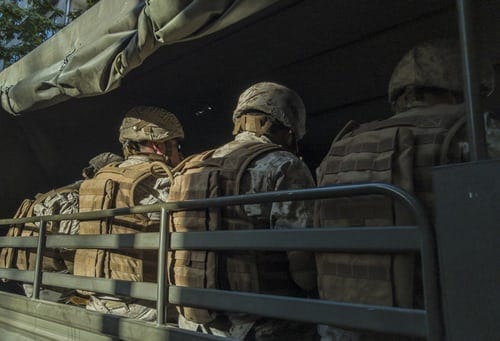Estimated reading time: 5 minutes
I worked with some super-smart enlisted folks while I was in the military. Many already had their undergraduate degree and have the opportunity to pursue a graduate degree with their GI Bill after leaving the military.
How smart? One day I walked down into my platoon area and two of the team leaders were discussing rocket science. And beyond just those two, our intel shop had an E-4 who already had two Master’s Degrees and spoke three languages.
Like I said, smart.
But unfortunately, the nation’s elite graduate schools are much more tilted toward veterans from the officer ranks than they are from the enlisted corps. There can be some reasons this is understandable.
By the nature of their service officers already have their undergraduate degree whereas there is no necessity for this requirement from the enlisted corps. From a simple numbers game, it makes sense, then, that the veteran population at these schools will be skewed toward officers.
The role of an officer is also viewed, both within the military and outside of it, as being more of the “corporate” job. It then makes sense that officers would go into more “corporate” careers after their service, which often entails going to get a graduate degree like an MBA.
Our enlisted veterans still have a lot to give and there is no reason they cannot compete with officers when it comes to graduate school admissions. And being armed with the GI Bill gives any ambitious service member a huge way to make graduate school possible.
So what’s holding them back?
They don’t try
Simply- those from the enlisted ranks choose not to even apply to top programs. They run by this internal script that tells them, “Oh, those places are only for officers. I couldn’t get in there as a former NCO.”
If you don’t even try, you won’t know. There are enlisted veterans at top law schools, MBA programs, and in the ranks of corporate America. How did they get there?
They tried. And did.
They didn’t think they could afford it
It can be easy for officers and enlisted alike to think that they cannot afford a top-tier education, whether graduate or undergraduate.
There are lots of possibilities and scenarios when using the GI Bill, but it already can take a huge chunk out of the costs. Couple that with the Yellow Ribbon Program, federal aid, and private scholarships (check out Scholly to access thousands of private scholarships) and quickly that top-tier education doesn’t seem nearly as expensive as you may have first thought.
Yes, life may have to be a bit more plain while in school, but the return on investment for top-tier graduate education is well worth it. Don’t let that GI Bill go to waste.
Corporate America tends to focus on officers
A common statistic thrown around in military circles is that less than 1% of the nation has served. And increasingly, the trend is going that this number is becoming denser among a smaller portion of families and networks.
What does this mean? It means that fewer people know and appreciate the challenges of military service.
Many people do not know anyone who serves in the military and they have an uninformed idea of what people in the military do. Unfortunately, this tends to lead many to think that “officers are the smart ones” and that “the enlisted are the dumb ones.”
I knew plenty of officers who were idiots and plenty of enlisted who were incredibly intelligent.
But for enlisted folks, I think they can sometimes feel the weight of this dynamic which can cause them to think that they won’t have a place in top graduate programs and afterward in corporate life.
What matters is the value you can bring to an organization. Military rank isn’t likely to be that value; intrinsic capabilities, education, and work attributes are.
The JMO help community is dense
For all the reasons listed above, there are a lot of people, sites, and services that tend to focus on helping the JMO community transition into high-paying jobs and graduate education. I could see how this support network might be intimidating to someone from the enlisted ranks and cause them to think, “Oh, well everyone only wants JMOs so I might as well not even apply.”
Again, if you have value — you have value. The rank doesn’t matter.
The ETS/EAS process promotes passivity
But don’t blame it. That won’t get you anywhere.
Officers (at least speaking from my experience with the army) have to be proactive in getting out. We have to compile a bunch of memos and sit down with our chain of command and detail to them why we are leaving. This (can) incite action in officers during their transition and have them start thinking more heavily about what they want to do and where they want to go to school after their service.
Our enlisted brethren simply have to wait for the clock to run out. My theory is that this can promote a more passive attitude toward the transition process and prevent people from pursuing more competitive options.
There’s no need as a member of either the officer or enlisted ranks to go at this alone. Programs like Service to School, Veterati, and American Corporate Partners can help you find mentors to craft a compelling story that shows your performance history and capabilities as a leader, regardless of your rank.
Don’t let the external scripts of everyone around you dictate the outcomes you choose for yourself. Make your own choices.
Related:
Military to MBA (Part 1/7): Is It for You?


Mark, you really have insight!